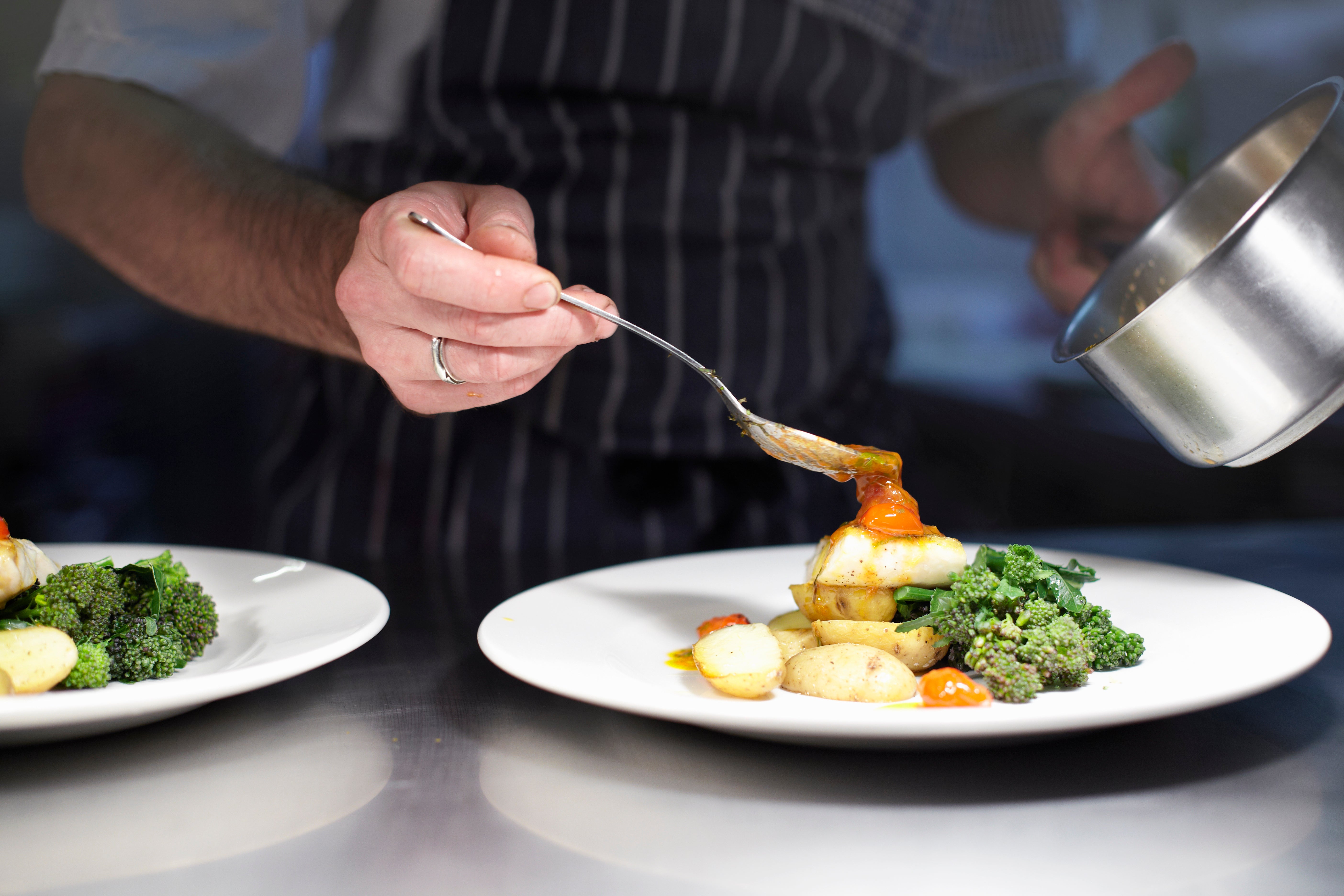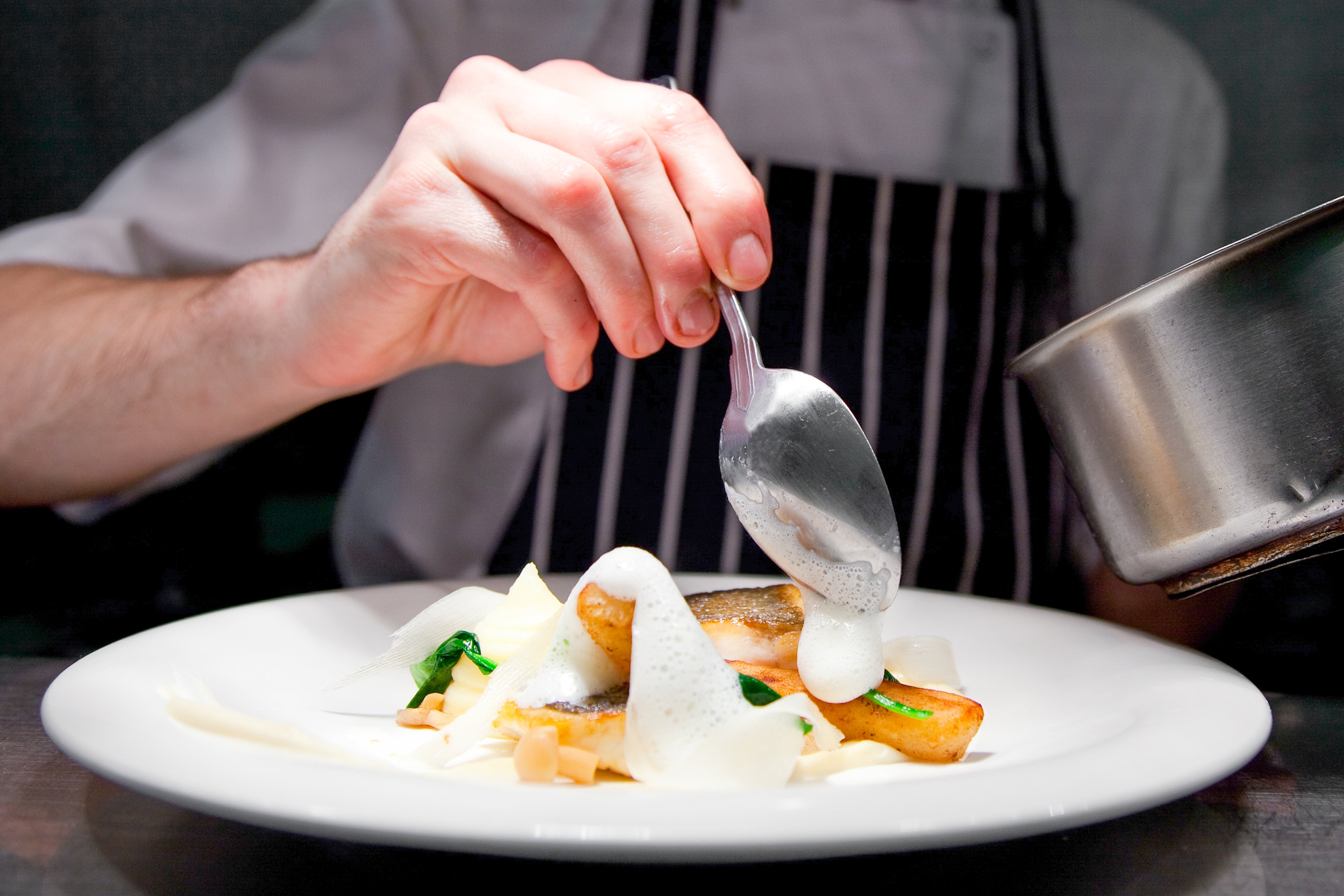Fancy a cooking lesson with your favourite chef? The ‘OnlyFans’ of the food world is your answer
With more chefs out of work as the hospitality industry stays shuttered, Kieran Morris looks at new platform, Demi, helping them to make money and stay afloat

I could sense Ian Moore’s excitement when he messaged me out of the blue last August, to share that he had just raised funds for his own company. Having worn a good few hats in his time – editor-in-chief of VICE Denmark, creative director at LADBible, COO of Copenhagen distillery Empirical Spirits – I wondered what industry he had chosen to start up in. “Food + marketplace + tech,” he explained. “OnlyFans for chefs. OnlyPans. OnlyFlans.”
This was the genesis of Demi, a chef-led community platform – almost a social network – where customers and fans pay a monthly fee to enter into exclusive culinary group chats. OnlyFans was Moore’s first, and I think light-hearted, point of comparison, but the parallels are self-evident: on Demi, as with OnlyFans, Substack, Patreon and other subscription services, the chefs act as “content creators”, selling their expertise and their perspective, rather than selling their food. In turn, subscribers can ask questions to their favoured chefs, show off their own creations, and speak to other like-minded foodies.
“The pandemic didn’t prompt the idea,” Moore says, “but it did expedite it”. His eureka moment came while cooking a meal for his in-laws, and texting his friend – a former head chef at three Michelin starred Maaemo in Oslo – for guidance on his presentation. “I thought, ‘there has to be something in this’,” he says. Turning away from the idea of a one-to-one, “ask a chef” kind of service, Moore thought about how best to recreate that open, friendly restaurant atmosphere he’d enjoyed in pre-Covid Copenhagen, where you could just as easily ask the chef as you could the person sitting next to you about the dish you were eating.
Sat in a pub with a pint of Guinness on a warm July evening, he fired his entire pitch over the phone to a friend in California who’d previously helped him raise funding. Six weeks and hundreds of phone calls later, he had $1.5m (£1.08m) from a range of investors, and had permission to go out and build his community platform. “I canvassed countless chefs to find out the features they’d like,” he says, “and not just restaurant chefs – YouTube chefs, TikTok chefs, private chefs. This needed to be a tool built with them in mind, that can slot alongside their everyday life.”
It currently exists in beta form and is very stripped-back: just a payment service, and five WhatsApp chats, covering topics from Chinese cooking to cocktail making and baking, each coordinated by an industry professional who receives 100 per cent of the subscription money. Chat hosts will bring in guests, start off conversation topics, and generally set the pace. As reported byBusiness Insider, there are around 700 subscribers at the moment, mostly brought in through the chefs’ Instagram pages, but the plan is to launch an app where everything, from chats to events, is on the platform.
We get these amazing little peeks into other people’s worlds
To get a feel for what Demi was like in practice, I signed up to its baking-oriented chat, named the “Never Ending Salon”, led by New York-based pastry chef Natasha Li Pickowicz. Upon signing up, I was given ice-breaker questions to introduce myself: name, location, chocolate or vanilla?, and my desert island dessert (Basque cheesecake). I’d arrived mid-flow, as community members were going back and forth about the multitude of uses for tahini in desserts. As I checked the chat over the passing days, I saw conversation move from the trials and tribulations of making granola, to celebrations of thickly-buttered bread, to sharing inspirational letters on gloomy mornings.
I spoke privately to Felicity Spector, one of the chat’s most active members, about her time on Demi. “It’s an incentive to get making things,” she says. “It has alerted me on what books to buy, what types of flour to buy, everything.” But more than this, she tells me, as someone who works from 9am to 9pm on the relentless news beat, it has become an invaluable tool to decompress with after work. “I really appreciate the fact I can dive in there at any time, with everyone chatting in different time zones, and just lose half an hour to it without even really noticing.”
This diversity of voices is one of Pickowicz’s most cherished aspects to her group chat, and something she wants to put front-and-centre of her activities on the platform. “We get these amazing little peeks into other people’s worlds,” she tells me, “people from all over the US, Canada, the UK, France, Spain, Singapore. Ingredients they’ve sourced, bakeries they’ve stumbled upon.” Pickowicz was very conscious in wanting to set up a salon, rather than a pastry-exclusive group chat; first and foremost, she wanted it to not solely be about her own expertise, but a place for amateurs and professionals to share their thoughts on everything from snickerdoodles to the universe.
Her virtual events, or happy hours as they’re known in the chat, introduce guests with all manner of expertise: collectors of antique bakeware, radical archivists of Asian American/diasporic culture, even Pickowicz’s own parents, who kicked off the salon’s Lunar New Year celebrations with a chat about cultural traditions. “I like to keep things fun and loose, but at the same time, people have expectations with a service that they’re paying for, and you have to think about what members of the chat will want, and the insights you can offer them.”

Pickowicz says she feels uncertain about her future in the restaurant industry, having been made redundant from her restaurant group in July, but Demi has given her a new, fun outlet in which to devote her time and energy. “It enhances my other projects in a really organic way,” she says. “I’ve just started a cookbook, and the salon is great because it has helped me think about the type of baker who I’d want to buy and use my recipes: not advanced or professional bakers, per se, but curious ones.”
Financially, Demi’s benefit is already being felt by the five community leaders on the platform, with Moore telling me that their average annualised income is around $11,000 (£8,000) a year, and increasing month by month. “That’s 20 per cent of a head chef’s salary in the US, just for their expertise and their time. Chefs deserve that, especially at the moment, because they’re experts in their field, and they should be able to make a living from that.”
Demi’s full launch is slated for April, and Moore says that he has hundreds of chefs ready to launch with it, with the potential for thousands more should it prove to be a platform that chefs can clip on to the rest of their day-to-day lives. “We researched how many chefs have a decent following on Instagram, say, and it’s a lot. Like six-figures. I’m not saying we can bring in all of them, but if we get a decent block, and they bring in just 80 people with them, then there’s no telling how big we could be.”
Aside from the monetary aspect, and the prospect of scaling up, the priority for Moore, Pickowicz and Spector is that Demi remains a place to build lasting relationships, and communities full of positivity. “For me,” says Pickowicz, “the pandemic has narrowed the distance between kitchen and diner, and the food world is opening up. Not just about the harsh realities of kitchen life – pay equity, mental health challenges, traumas and abuses – but about what people on either side of the counter really love and appreciate about food and cooking.”
Nobody can predict whether the vibrant restaurant atmospheres that inspired DEMI will ever fully return, but as we wait to find out, these online communities developed in lockdown could be here to stay.



Join our commenting forum
Join thought-provoking conversations, follow other Independent readers and see their replies
Comments